高二英语模块六第一单元语法 现在时用法课件
文档属性
| 名称 | 高二英语模块六第一单元语法 现在时用法课件 |
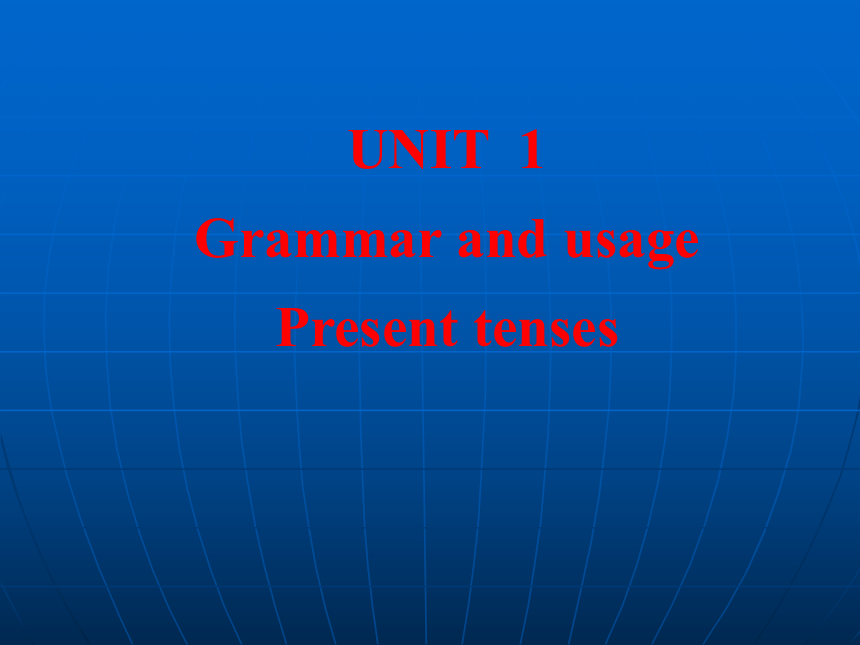
|
|
| 格式 | zip | ||
| 文件大小 | 260.4KB | ||
| 资源类型 | 教案 | ||
| 版本资源 | 牛津译林版 | ||
| 科目 | 英语 | ||
| 更新时间 | 2013-12-22 16:04:03 | ||
图片预览

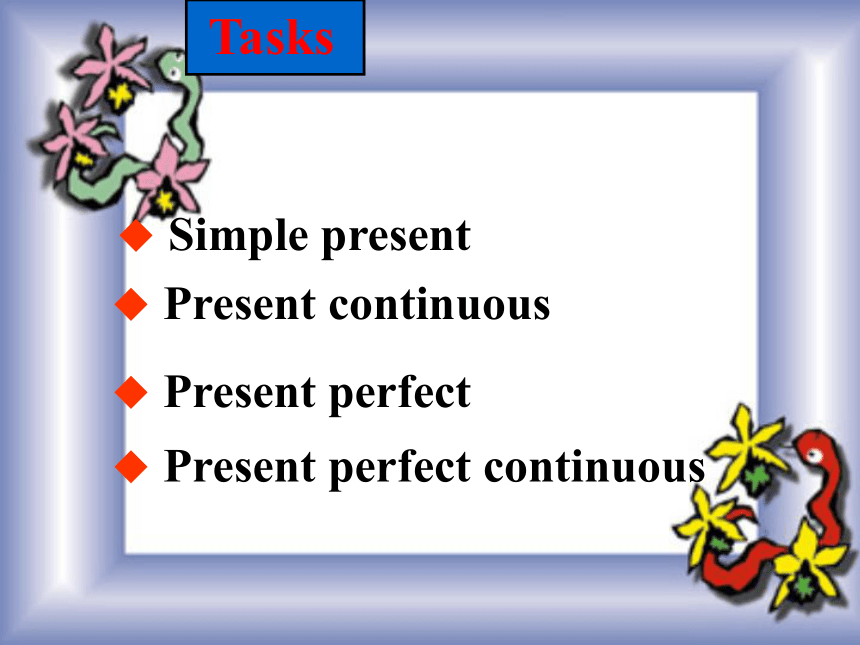
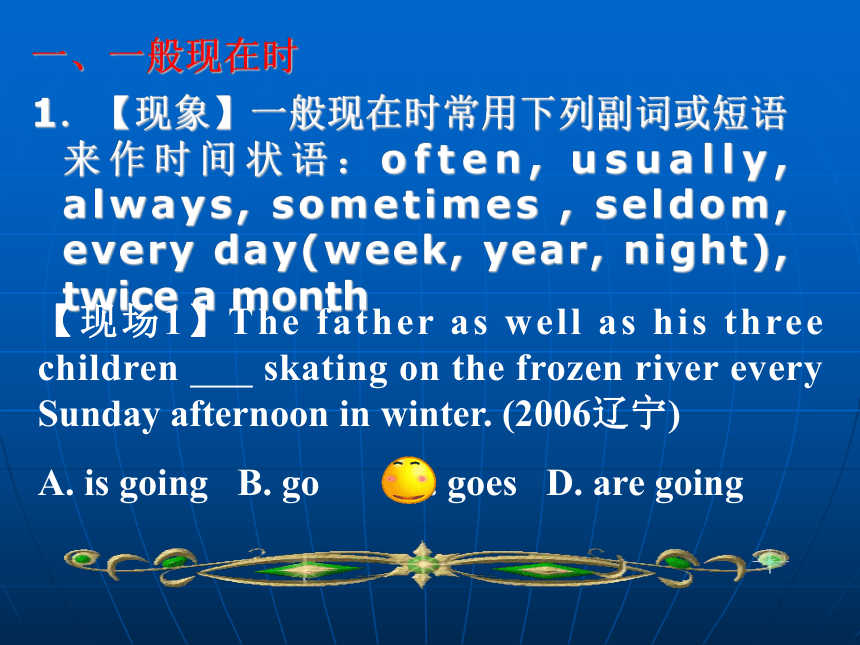
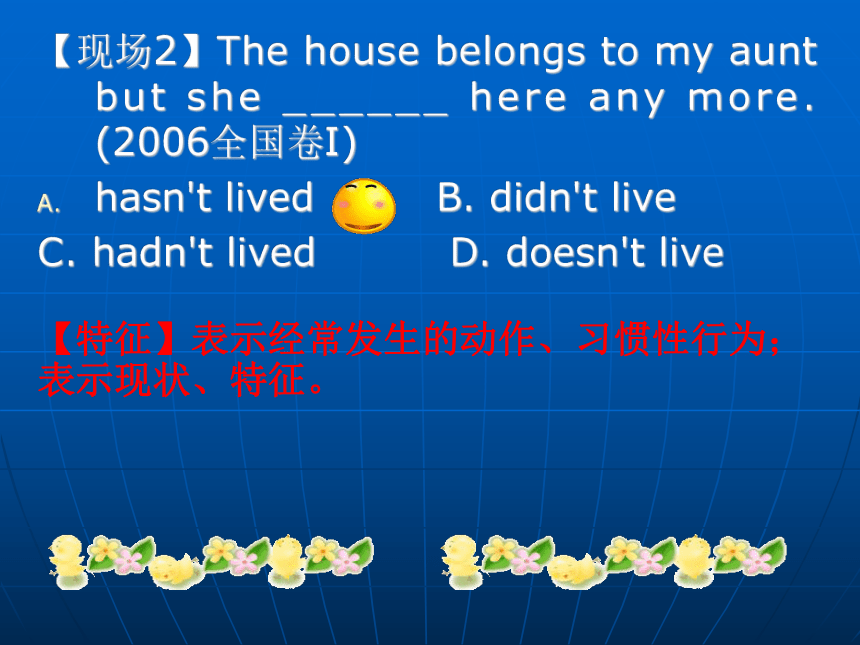
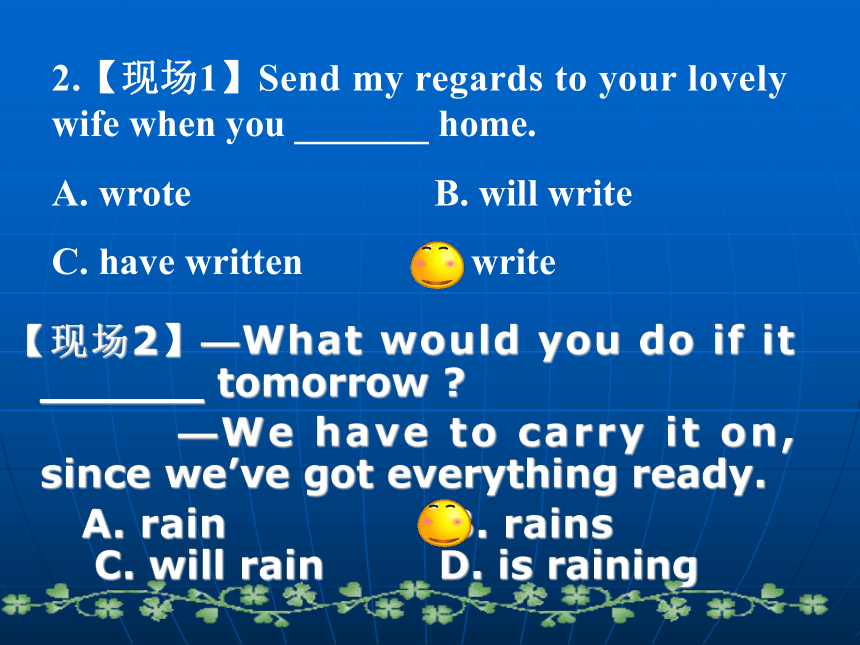
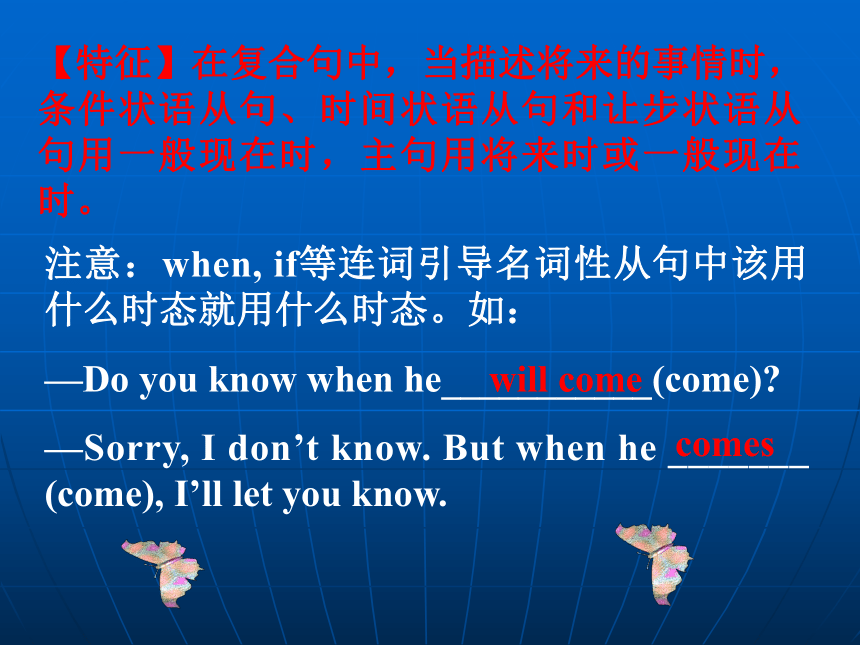
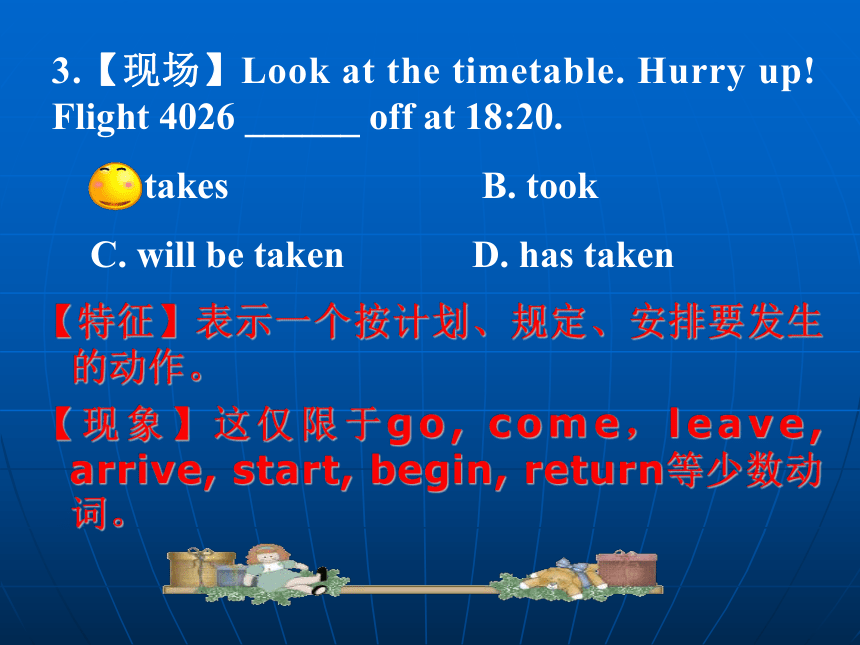
文档简介
课件19张PPT。UNIT 1
Grammar and usage
Present tenses Simple present Present continuous Present perfect Tasks Present perfect continuous 一、一般现在时
1.【现象】一般现在时常用下列副词或短语来作时间状语:often, usually, always, sometimes , seldom, every day(week, year, night), twice a month【现场1】The father as well as his three children skating on the frozen river every Sunday afternoon in winter. (2006辽宁)
A. is going B. go C. goes D. are going【现场2】The house belongs to my aunt but she ______ here any more. (2006全国卷I)
hasn't lived B. didn't live
C. hadn't lived D. doesn't live【特征】表示经常发生的动作、习惯性行为;表示现状、特征。2.【现场1】Send my regards to your lovely wife when you _______ home.
A. wrote B. will write
C. have written D. write【现场2】—What would you do if it ______ tomorrow ?
—We have to carry it on, since we’ve got everything ready.
A. rain B. rains C. will rain D. is raining注意:when, if等连词引导名词性从句中该用什么时态就用什么时态。如:
—Do you know when he___________(come)?
—Sorry, I don’t know. But when he _______ (come), I’ll let you know. 【特征】在复合句中,当描述将来的事情时,条件状语从句、时间状语从句和让步状语从句用一般现在时,主句用将来时或一般现在时。
will comecomes3.【现场】Look at the timetable. Hurry up! Flight 4026 ______ off at 18:20.
A. takes B. took
C. will be taken D. has taken
【特征】表示一个按计划、规定、安排要发生的动作。
【现象】这仅限于go, come,leave, arrive, start, begin, return等少数动词。【特征】表示客观事实或普遍真理。4. 【现场】Months ago we sailed ten thousand miles across this open sea, which _______ the Pacific, and we met no storms. (2005辽宁卷)
A.was called
B.is called
C.had been called
D.has been called二、现在进行时
1.【现场】Listen to the two girls by the window. What language ___________? (全国卷3)
A. did they speak B. were they speaking
C. are they speaking
D. have they been speaking【特征】表示说话时正在进行的动作。2. 【现场】Since I won the big prize, my telephone hasn't stopped ringing. People _____ to ask how I am going to spend the money. (2005湖南卷)
phone B. will phone
C. were phoning D. are phoning
【特征】表示现阶段内在进行的动作,但不一定在说话时进行或表示正在发展正在变化的情况。3. 【现场】Tom, you ______ things about. What a mess your room is!
A. always leave
B. will leave
C. are always leaving
D. left
【特征】句中若用always, all the time, constantly, forever等词或词组时,用进行时态描述一个频繁发生的动作,相当于“老是……”,表示说话人的赞赏、责备、厌恶等感情。
4. 【现象】这类动词有come, go, leave, arrive, start, stay, move,meet, take, give等。
【现场】I ______ for Shanghai tomorrow and the train ______ at 8:50.
A. will leave; will leave
B. am leaving; leaves
C. am leaving; is leaving
D. will leave; is leaving【特征】某些运动性动词可用进行时表示按计划即将发生的动作,强调主观打算或推测。
三、现在完成时
1. 【现场】He was hoping to go abroad but his parents ______ that they won’t support him unless he can borrow money from the bank. (2005湖北卷)
A.were deciding B.have decided C.decided D.will decide
【特征】表示在说话之前已经完成的事态,但与现在有联系,即侧重该事态对现在的影响。
2. 【现场1】My friend, who ______ on the International Olympic Committee all his life, is retiring next month. (2006浙江卷)
A. served B. is serving
C. had served D. has served
【现场2】1. My brother is an actor. He _________ in several films so far. (2005浙江卷)
A.appears B.appeared C.has appeared D.is appearing
【特征】表示从过去某一时刻开始,持续到现在的动作或状态,也许还会继续下去。
【现象】常用时间状语有:for, since引起的短语,so far, already, yet, just, today, now, recently, lately, this week, this month, this year, these days, during/in the last/past few years, 疑问词How long的句子中,还有ever, never, before等。
【现场】—_____leave at the end of this month.
—I don’t think you should do that until ______ another job. (2006北京卷)
A. I’m going to; you’d found
B. I’m going to; you’ve found
C. I’ll; you’ll find
D. I’ll; you’d find
现在完成时在时间或条件状语从句中,代替将来完成时。
3. 【现场1】—Do you know our town at all?
—No, this is the first time I ______ here.
A. have been B. had been
C. was D. will be
【现场2】The coffee is wonderful ! It is the best coffee I _____ before.
A.was having B.have
C.have ever had D.had ever had【特征】下列句型的从句中要用现在完成时: ①It(This /That)is the first time(that)… ②It(This /That)is the only /the first /the best …(that) …四、现在完成进行时
【特征】现在完成进行时与现在完成时相比侧重于这个动作的不间断性或未完成性。有时强调动作的反反复复。
【现场1】I won't tell the student the answer to the math problem until he ____on it for more than an hour. (2006湖北卷)
A. has been working
B. will have worked
C. will have been working
D. had worked
【现场2】Now that she is out of a job. Lucy ______ going back to school, but she hasn’t decided yet.(2004北京)
A. had considered B. has been considering
C. considered D. is going to consider
Grammar and usage
Present tenses Simple present Present continuous Present perfect Tasks Present perfect continuous 一、一般现在时
1.【现象】一般现在时常用下列副词或短语来作时间状语:often, usually, always, sometimes , seldom, every day(week, year, night), twice a month【现场1】The father as well as his three children skating on the frozen river every Sunday afternoon in winter. (2006辽宁)
A. is going B. go C. goes D. are going【现场2】The house belongs to my aunt but she ______ here any more. (2006全国卷I)
hasn't lived B. didn't live
C. hadn't lived D. doesn't live【特征】表示经常发生的动作、习惯性行为;表示现状、特征。2.【现场1】Send my regards to your lovely wife when you _______ home.
A. wrote B. will write
C. have written D. write【现场2】—What would you do if it ______ tomorrow ?
—We have to carry it on, since we’ve got everything ready.
A. rain B. rains C. will rain D. is raining注意:when, if等连词引导名词性从句中该用什么时态就用什么时态。如:
—Do you know when he___________(come)?
—Sorry, I don’t know. But when he _______ (come), I’ll let you know. 【特征】在复合句中,当描述将来的事情时,条件状语从句、时间状语从句和让步状语从句用一般现在时,主句用将来时或一般现在时。
will comecomes3.【现场】Look at the timetable. Hurry up! Flight 4026 ______ off at 18:20.
A. takes B. took
C. will be taken D. has taken
【特征】表示一个按计划、规定、安排要发生的动作。
【现象】这仅限于go, come,leave, arrive, start, begin, return等少数动词。【特征】表示客观事实或普遍真理。4. 【现场】Months ago we sailed ten thousand miles across this open sea, which _______ the Pacific, and we met no storms. (2005辽宁卷)
A.was called
B.is called
C.had been called
D.has been called二、现在进行时
1.【现场】Listen to the two girls by the window. What language ___________? (全国卷3)
A. did they speak B. were they speaking
C. are they speaking
D. have they been speaking【特征】表示说话时正在进行的动作。2. 【现场】Since I won the big prize, my telephone hasn't stopped ringing. People _____ to ask how I am going to spend the money. (2005湖南卷)
phone B. will phone
C. were phoning D. are phoning
【特征】表示现阶段内在进行的动作,但不一定在说话时进行或表示正在发展正在变化的情况。3. 【现场】Tom, you ______ things about. What a mess your room is!
A. always leave
B. will leave
C. are always leaving
D. left
【特征】句中若用always, all the time, constantly, forever等词或词组时,用进行时态描述一个频繁发生的动作,相当于“老是……”,表示说话人的赞赏、责备、厌恶等感情。
4. 【现象】这类动词有come, go, leave, arrive, start, stay, move,meet, take, give等。
【现场】I ______ for Shanghai tomorrow and the train ______ at 8:50.
A. will leave; will leave
B. am leaving; leaves
C. am leaving; is leaving
D. will leave; is leaving【特征】某些运动性动词可用进行时表示按计划即将发生的动作,强调主观打算或推测。
三、现在完成时
1. 【现场】He was hoping to go abroad but his parents ______ that they won’t support him unless he can borrow money from the bank. (2005湖北卷)
A.were deciding B.have decided C.decided D.will decide
【特征】表示在说话之前已经完成的事态,但与现在有联系,即侧重该事态对现在的影响。
2. 【现场1】My friend, who ______ on the International Olympic Committee all his life, is retiring next month. (2006浙江卷)
A. served B. is serving
C. had served D. has served
【现场2】1. My brother is an actor. He _________ in several films so far. (2005浙江卷)
A.appears B.appeared C.has appeared D.is appearing
【特征】表示从过去某一时刻开始,持续到现在的动作或状态,也许还会继续下去。
【现象】常用时间状语有:for, since引起的短语,so far, already, yet, just, today, now, recently, lately, this week, this month, this year, these days, during/in the last/past few years, 疑问词How long的句子中,还有ever, never, before等。
【现场】—_____leave at the end of this month.
—I don’t think you should do that until ______ another job. (2006北京卷)
A. I’m going to; you’d found
B. I’m going to; you’ve found
C. I’ll; you’ll find
D. I’ll; you’d find
现在完成时在时间或条件状语从句中,代替将来完成时。
3. 【现场1】—Do you know our town at all?
—No, this is the first time I ______ here.
A. have been B. had been
C. was D. will be
【现场2】The coffee is wonderful ! It is the best coffee I _____ before.
A.was having B.have
C.have ever had D.had ever had【特征】下列句型的从句中要用现在完成时: ①It(This /That)is the first time(that)… ②It(This /That)is the only /the first /the best …(that) …四、现在完成进行时
【特征】现在完成进行时与现在完成时相比侧重于这个动作的不间断性或未完成性。有时强调动作的反反复复。
【现场1】I won't tell the student the answer to the math problem until he ____on it for more than an hour. (2006湖北卷)
A. has been working
B. will have worked
C. will have been working
D. had worked
【现场2】Now that she is out of a job. Lucy ______ going back to school, but she hasn’t decided yet.(2004北京)
A. had considered B. has been considering
C. considered D. is going to consider
同课章节目录
